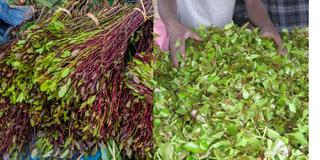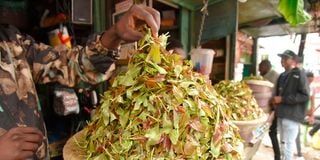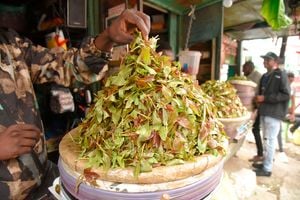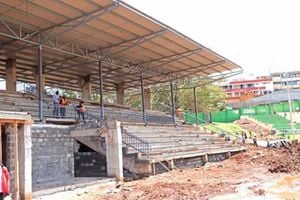
Mombasa Governor Abdulswamad Nassir gives his inauguration speech after his swearing-in at the Mama Ngina Waterfront Park in Mombasa City on September 15, 2022.
Mombasa and Kilifi counties have banned the entry, transportation, distribution, sale and use of muguka within its territories as Kwale and Taita Taveta put stringent measures to control use of the stimulant.
The move quickly attracted the ire of Embu and Kirinyaga counties, with Embu Governor Cecily Mbarire protesting against the move that she said is a Sh22 billion economy in her county, and injects Sh1 million to Mombasa daily, in levies.
Kilifi County Government becomes the second county after Mombasa, as Taita Taveta and Kwale both threatened to follow the same steps as major stimulant producers threaten to go to court as a result of losses.
Leaders from the coastal region believe the stimulant is to blame for ruining the lives of many youths and families in the region.
Through Executive Orders, Governors Abdulswamad Nassir (Mombasa) and Kilifi’s Gideon Mung’aro banned the entry, transportation, distribution, sale and use of muguka within their counties.
“In exercise of the powers conferred in Section 30(2)(1) of the County Government Act and all other enabling laws of Kenya, I order and direct that, there be a total prohibition on the entry, transportation, distribution, sale and use of muguka and its products within Kilifi County,” said Mr Mung’aro.
Mr Nassir was the first to ban it, signing an order, protesting the effects of the stimulant.
“We have tried to come up with regulations so that users and the larger community can co-exist but they have refused and for this reason I have consulted legally and found my decree to be in order,” said Mr Nassir.
Also Read: Why Mombasa has banned muguka
Taita Taveta Governor Andrew Mwadime also pledged to ban the leaves grown majorly in Embu County, but also found in Kirinyaga and Meru.
In Kwale, residents want the county boss Fatuma Achani to increase cess charges for muguka and miraa. During a Kwale Finance Bill 2024 public participation forum in Mwereni, Mwavumbo, Tsimba Golini and Kubo South residents proposed new rates for muguka.
They demanded increment of the muguka charges from Sh10,000 to Sh100,000 per vehicle entering the county. The move, the residents said, will regulate muguka and miraa business in the county.
The move by the coastal counties was rejected by Governor Mbarire, who said the county’s legal teams will move to court to challenge the matter.

A photo of Miraa (left) and Muguka (right).
“The muguka value chain is estimated to contribute approximately Sh22 billion per year to the economy of Embu. Muguka farmers and other players who have invested heavily on the value chain therefore stand to lose in terms of revenue and livelihoods.
"The muguka value chain contributes approximately Sh1 million to the Mombasa economy per day in transport levies,” said Ms Mbarire.
She was protesting specifically on Mombasa ban, which was effected on Thursday, before Kilifi one came on Friday.
Embu and Kirinyaga farmers who supply a big chunk of Muguka to the port city are now up in arms saying the move has dealt a big blow to their business, which earn them about Sh11 million a day and vowed to fight until Mr Nassir revoked the ban.
Led by the Mbeerembu Miraa Cooperative Union chairman Jervasius Nyombyekothe, the farmers stressed that Mombasa is currently the largest market of their produce and rejected the decision by Governor Nassir.
“We shall seek court redress following the ban which has caused farmers to incur heavy losses,” said Thomas Mutugi, one of the farmers.
Mr Mutugi said that farmers from Embu and Kirinyaga deliver 36,000 kilogrammes of muguka to Mombasa every day and the ban has adversely affected their livelihoods.
“ Every day muguka earns farmers a total of Sh10.8 million and the decision by the Mombasa Governor will be challenged in court,” said Mr Mutugi who has 21 acres of miraa in Kirinyaga county.
One kilogramme of muguka is sold between Sh300 and Sh600 and farmers have been making a killing out of its farming.
Alarming cases of admissions at mental health centres and rehabilitation facilities in Mombasa have raised concerns, with victims being associated with the use of muguka and other illicit drugs and substance abuse.
According to the Executive Director Reachout Centre Trust Mr Taib Basheeib, data at the facility shows a stark reality of how substance abuse is affecting the county’s population. The organisation located in Mombasa’s Old Town has been providing preventive and treatment services to addicts battling substance abuse related disorders.
“It is shocking that the data we have shows the numbers of those we have enrolled in rehabilitation centres. The numbers of those using muguka for example have increased to 1,500 from 1,000, data recorded from January-May 2024, out of these cases, we have referred at least 100 patients to Port Reitz mental facility for admission,” he said.
In terms of the age bracket, the centre has recorded a huge number of youths consuming the stimulant, the bigger percentage being those aged between 15 and 25. They are mostly school dropouts or jobless and are struggling with health conditions such as insomnia or lack of sleep and ulcers in the mouth due to daily chewing.
Most of them are agitated and some even turning violent hence leading to the rise in the use of the anti-depressants to suppress their addiction and control their sleeping patterns.
“The cost of sustaining muguka use is untenable for most of them and we have cases of youngsters between 10-15 years coming to for help. Miraa is expensive and therefore so many people are turning to muguka because it is cheaper,” he added.
In some cases, Mr Taib says they have encountered scenarios where victims suffer dual diagnosis at the health facilities.

Muguka traders display their wares in Nakuru City
This means that some of them have mental health conditions and at the same time suffer from addictions, hence stressing the available health infrastructures as well as creating financial burden to families.
At the Mombasa Women Empowerment Network and Mental Rescue Centre, 80 percent of the men admitted at the facility have addictions related to muguka.
The facility is providing the individuals with mental health services, support and care.
The chairperson of the organisation Amina Abdallah lauded action the county government of Mombasa is undertaking, calling for proper sensitisation about the stimulant.
“Today 80 percent of our patients in Miritini are muguka addicts,” said Ms Amina.
Yesterday, Mombasa County started implementing the ban by installing surveillance in Likoni, Miritini and even Shanzu to block entry of the stimulant into Mombasa.
Additional reporting by Winnie Atieno










